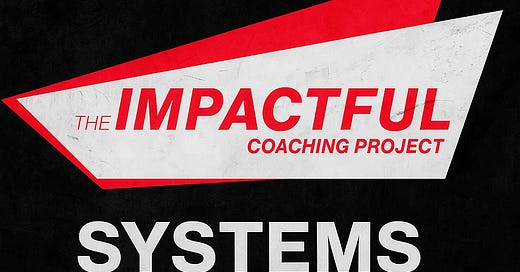I was in a meeting last week and somehow got to talking about what I would do different if I went back into coaching baseball. As I reflected, there were two things that came to mind.
First, I spent alot of time on stuff that didn’t really matter…the extra detail work of trying to find some hidden weakness in an opponent, ways I could help a kid develop, or watching film hours on end (yes…I did this in baseball coaching.)
The second one I mentioned is I would make some simple changes in how I spent my time to build up my players more. In our ICP language, cultivate efficient systems of care.
Some of the most impactful systems in coaching aren’t flashy—they’re simple, consistent, and grounded in care. Developing a culture where athletes feel seen and supported doesn’t require grand gestures or expensive programs. Often, it just takes planning and consistency.
Here are a few simple systems any coaching staff can put into place to foster a culture of care:
The Walk and Talk: Before and after practice, have each coach walk with a different athlete. If your facility doesn’t lend itself to a long walk, simply connect when the athlete arrives. The goal is connection—one small conversation at a time.
30-Second Touch Points: During warm-up, each coach intentionally connects with 2–3 athletes for at least 30 seconds and use say their name. Don’t talk strategy. Just check in on them as people.
Texting with Intention: After each practice, text one athlete a specific and authentic message—“Loved how you supported your teammate during the drill,” beats “Good job today.”
Short Post-Practice Huddles: Keep post-practice talks under three minutes. Athletes are tired. Long debriefs often serve the coach more than the players.
Dead Time Dialogue: Sports like baseball, softball, or track naturally include downtime. Use it. Walk around, ask questions, and connect—not about sport, but about life.
One of my favorite examples of a system of care comes from the late college baseball legend, Augie Garrido, who won nearly 2,000 games. Known for his intensity (search him on YouTube—but have your headphones on when you listen), he also had an incredible system for checking in on his players emotionally.
Each day, Garrido paid close attention during warm-ups, especially when players were playing catch. He had specific expectations for how they threw. When a player wasn’t hitting their target consistently, he’d ask, “What’s going on?” These were elite athletes. If they weren’t sharp, something was probably off. And Augie noticed. Consistently.
Players thought he had a sixth sense. In reality, he just had a system—and he cared enough to pay attention. That simple act of noticing became a daily ritual. Players didn’t even realize they were being observed so closely, but they felt it. And that led to trust.
Care that’s built into the rhythm of a program becomes the culture. Not because of slogans, but because of how people feel. And people remember how they felt.
In a world that often rewards the dramatic, it’s these simple small daily acts of care that build something meaningful and lasting.
Check out our book!
Things That Are Making Us Think
"The test of a first-rate intelligence is the ability to hold two opposed ideas in mind at the same time and still retain the ability to function."
– F. Scott Fitzgerald
The gift with the highest return: believing in someone before they believe in themselves.
– Shane Parrish





